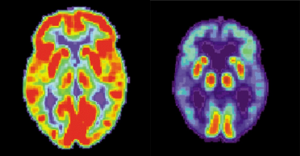
Alzheimer’s disease (AD) is the most common form of dementia, a syndrome characterized by brain function loss that can affect memory, thinking and communication. The disease generally affects those over 65 and is associated with the accumulation of proteins β-amyloid between nerve cells and phosphorylated tau within nerve cells. These protein aggregates are thought to disrupt nerve cell function.
The week of March 11th is Brain Awareness Week, a global campaign that promotes brain research and the ways it benefits us. We at ISRCTN are contributing to this campaign by discussing clinical trials related to AD, as it is increasingly relevant to our ageing global population. Currently, 1 in 3 British people born in 2015 are estimated to develop dementia.
Understanding Alzheimer’s

A 2017 study used magnetic resonance imaging to compare AD and late-onset bipolar disorder, a mental illness with similar cognitive and behavioral symptoms. Researchers found that AD was associated with more disruption in brain areas related to social and emotional processing and object recognition than bipolar disorder. This disruption was thought to be due to nerve cell degradation resulting in greater behavioral and emotional impairments.
An ongoing trial is investigating potential factors associated with the age of onset of AD and its rate of progression by using questionnaires, blood tests, brain imaging and patient histories. Researchers hope that identifying biomarkers, co-occurring conditions or lifestyle factors associated with AD, will facilitate more informed treatment and care plans for future patients.
Brain research into AD improves our understanding of the disease and is useful in the development of potential treatments.
Treatments
A recent study trained AD patients in ‘chunking’, a memory technique that involves recognizing and then compressing patterns of information. On average, trained patients, remembered sequences containing 6.3 numbers while untrained patients remembered sequences containing 5.8 numbers. Additionally, the training was associated with decreased functional activity in brain areas related to working memory. This indicated that less effort was required to remember the sequences.
The 2010 SOUVENIR trial investigated whether a drink designed to promote nerve cell growth could improve cognitive function in patients with mild AD. After 12 weeks 40% of the patients who consumed the drink daily had improved delayed recall of words. This was compared to only 24% of patients from the control group. However, a 2017 trial subsequently found that while the drink was associated with less cognitive decline, it had no significant impact on slowing the progress of dementia.
Brain research is vital for the development of treatments for AD but the important question is how much more research needs to be done before a cure is found?
A cure?
The 2008 AD2000 trial gave aspirin to AD patients. Past research revealed that AD is less common in aspirin users. In addition, aspirin prevents blood clots, which can increase the risk of AD. However, 2 years of aspirin treatment provided no worthwhile benefits to patients and increased the risk of serious bleeds. Similarly, the 2013 DARAD trial found that 12 months of treatment with two antibiotics was associated with significant deterioration in cognitive outcomes. The 2018 NILVAD trial found that 18 months of treatment with a blood pressure medication was associated with less cognitive decline in those with mild AD compared to untreated patients, but greater decline in patients with moderate AD.

Clinical trials into treatments and cures for AD are ongoing. The DESPIAD trial is testing whether the drug CPHPC will effectively treat AD and reduce levels of a component of the plaques found in AD-affected brains. Scientists hope that the results of this trial will be significantly positive.
Where does this leave us?
Alzheimer’s disease is increasingly prevalent and is costly to society and individuals. Alzheimer’s disease affects brain function. This means it attacks the organ which is fundamental to our sense of self and our perception of the world. Our brains embodies everything that makes us who we are; our thoughts, our memories, our emotions. Essentially, we are our brains.
Brain research has led to great strides in our understanding of Alzheimer’s disease, which is in turn bring us closer towards treatments and a potential cure. However, the number of clinical trials with negative results make it clear that our understanding is not yet complete. During this Brain Awareness Week, why not take a moment to appreciate not just what a miraculous organ your brain is, but also the people who are working daily to ensure that your brain functions well for as long as possible.
Comments